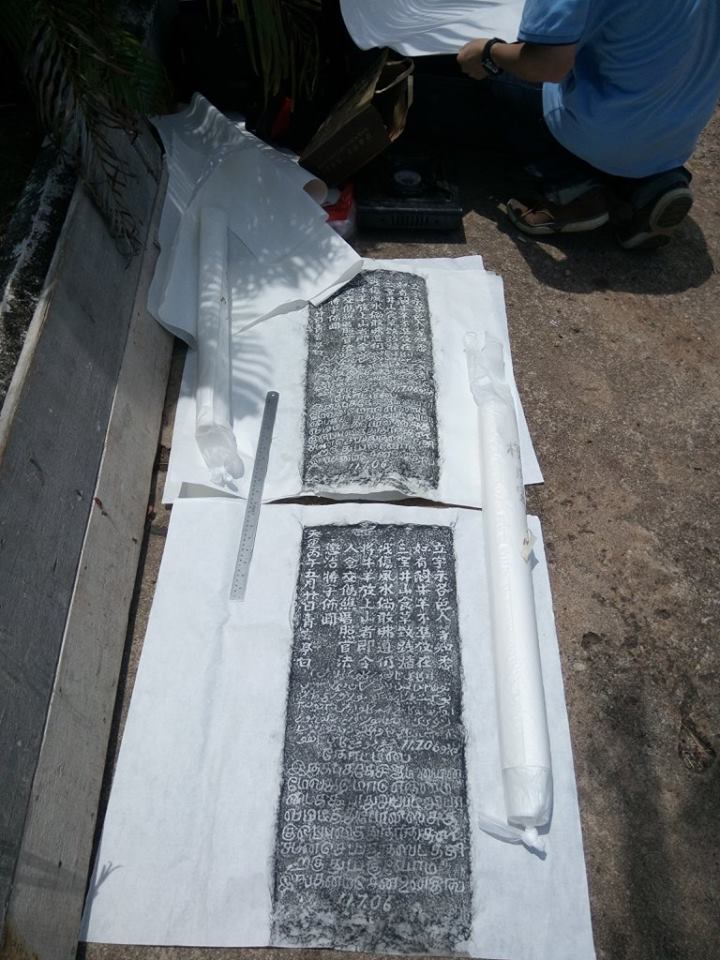Interpreting Hokkien, Jawi(Malay) and Tamil stone inscriptions found in Bukit Cina, Melaka
Many contemporary historians got it wrong when trying to interpret the history of ancient Melaka(Malacca) by looking at the Hanzi(Chinese characters) through the lens of Mandarin(a Beijing dialect).
Sadly, this is because of Mandarin-ization/English-nization of many modern Chinese people. They sort of forgotten or abandoned their own mother tongue in favour of Mandarin/English/etc. Heck, some even labelled Hokkien language written in Hanzi as old Mandarin[浮現中文].
Most of them didn't know that 中文 refers to the language or culture of China's Central Plain region. Where as 福建 (Hokkien) refers to China's Happy region.
NOTE : Here is an online tool that you use to get the Hokkien pronounciations by Hanzi
In fact, many of the ancient artifacts with Chinese writings in this part of the world are actually written in Hokkien instead of Mandarin with some loan words from Malays.
For example, the stone inscriptions(kinda like the Rosetta Stone) found at 三寶井山(Three Treasures Well Hill) are actually written in Hokkien at the top part, followed by Jawi(Malays) and Tamil script - ariccuvati. The stone tablet was placed nearby the 青雲亭廟(tshing hûn tîng biō) or Clear Sky Temple.....somewhere around the 青雲亭 - Clear Sky Pavilion, it is a place for people to walk around and enjoy the view of the sea from the hill in the old days.
NOTE : Here is an online tool that you use to use to translate Jawi to Rumi and back
If you try to read it as Mandarin, it won't make any sense.
p/s : By the way, if you know how to read Jawi and Tamils scripts, can you confirm that the message is the same? Please see the full text at the photos below.

Bukit cina Hang Li Poh's stone inscription carbon tracing

立字示各色人等知悉
li̍p jī sī kok-sik-lâng tíng ti-sik:
如有飼牛羊不準放在三寶井山食草致踐踏戕傷風水.
jû iú tshī gû-iûnn, put-tsún pàng tsāi Sam-pó-tsénn-suann tsia̍h-tsháu, tì tsiān-ta̍h tshiông-siong hong-suí.
倘敢弗尊仍將牛羊放上山者即令人拿交傌礁厝照官法懲治特字佈聞
thóng kám hut tsun, jîng tsiong gû-iûnn pàng tsiūnn suann--tsiá, tsik līng jîn ná-kau má-ta-tshù tsiàu kuann-huat tîng-tī ti̍k jī pòo-bûn.
天運丙午五月廿日青雲亭白
thian-ūn píng-ngóo gōo--gue̍h jia̍p-ji̍t tshing-hûn-tîng pi̍k
Idiomatic English:
Warning to the people not to let their cows and goats to graze at Three Treasures Well Hill because it will "damage" the scenery by trampling. Those that defy this order will be taken to the police station and to be punished according to the law.
Here are some literal translations from Hokkien to English:
飼牛羊 = tshī gû iûnn/ chi goo yeon = feed cow and goat
食草 = tsiah tsháu/chiak chow = graze
傌礁厝* = ma ta tshù/ mata choo = eye-house(literal) or police station(idiomatic)
*eye-house(bastardized from Malay word mata[eye] - referring to police or detective)
As for this line 天運丙午五月廿日青雲亭白, the idiomatic English translation is roughly:
5th month of the Lunar calendar, 20th day 3 o'clock afternoon by the management of Cheng Hoon Teng(Clear Sky Pavilion)
天運 = is an unofficial numerical system used by society elites or government officials in ancient China. See https://zh.wikipedia.org/wiki/天运
丙午 = the third place afternoon, which roughly means 3 o'clock afternoon.
五月 = 5th month
廿日 = 20th day
青雲亭 = Cheng Hoon Teng or clear-cloud-pavilion(literal)
白 = white color. However, in this context it means by
Most of the modern day Chinese people will have trouble interpreting this. Fortunately, there are equivalent date written in Jawi(Malays) and Tamils.
From the Jawi and Tamils writings, using the Arabic numeric system that we still use today... we can deduce from note of Wolfgang Franke- 傅吾康 and Chen Tiefan - 陳鐵凡 that “06” is year 1906.
Therefore, the date that this stone tablet notice being put up there is 11th July 1906 of the Gregorian calendar.
As a side note, at the time of writing... there is a rage going on in Malaysia because the Ministry of Education decided to introduce the art of Khat and Jawi back in primary school. The Chinese and Tamil educationists are opposed to this because they worried about the government using Khat(calligraphy) as a way of Islamization of the non-Muslims.
Now, I don't want to dwell too much into this topic. I'll leave it to you to make your own choices. However, I would like to point that 1,2,3,...0 these are Arabs numeric and also the word algorithm originated from Arab. Without these, there won't be computer/calculator/programming languages as we know and use today. The government already use Mandarin/Tamil speakers to talk about Islam on radio and TV today. IMHO, learning calligraphy won't cause you to change religion or turn you into a retard.
Conclusion:
Perhaps this is why those Mandarin educated bigots interpreted the historical artifacts through the lens of Mandarin instead of Hokkien got it wrong? Using their Mandarin clouded minds to claim that:
"Hang Tuah as Hang Too Ah, Hang Jebat was Hang Jee Fatt, Hang Lekir was Hang Lee Ker and Hang Lekiu was Hang Lee Kiew"
Haha :-)
Photos taken from this Facebook page without permission.



Location :
From space:
On the ground:
Interesting notes:
Another name for Admiral Cheng Ho(Zheng He) is 三寶(three gems) or 三保(three protections). Hence, the name of the place is called Sam Po Suann(Hill) or San Poh Suann by the locals in honor of Admiral Cheng Ho. Sam Po Suann is Hokkien pronounciation.
Before the arrival of Admiral Cheng Ho, there are already Hokkien villages in Melaka. They refer themselves as the Tang Dynasty people(唐人), which is true in a way, because they did reach Melaka way earlier than thought. Even today, some overseas Chinese still call themselves Tang Dynasty people(唐人).
References:
https://zh.wikipedia.org/wiki/%E5%A4%A9%E8%BF%90
https://zh.wikipedia.org/wiki/%E9%9D%92%E9%9B%B2%E4%BA%AD
https://www.facebook.com/pg/chenghoonteng/photos/?tab=album&album_id=504232339787402
https://ms.wikipedia.org/wiki/Bukit_Cina
https://www.facebook.com/groups/myhokkienculture/permalink/2129928593886115/?hc_location=ufi
http://journalarticle.ukm.my/1219/1/CeritaHangLi_Po.pdf
See also : Honestly speaking. I am Hokkien educated
By Adam Ng(黃武俊)
IF you gain some knowledge or the information here solved your programming problem. Please consider donating to the less fortunate or some charities that you like. Apart from donation, planting trees, volunteering or reducing your carbon footprint will be great too.
Advertisement
Something interesting
Advertisement
Tutorials
+12k Golang : How to display image file or expose CSS, JS files from localhost?
+7.6k Golang : Ways to recover memory during run time.
+12k Golang : flag provided but not defined error
+5.6k Golang : Markov chains to predict probability of next state example
+6k Golang : Calculate US Dollar Index (DXY)
+8.5k Golang : Combine slices but preserve order example
+7k Golang : Of hash table and hash map
+11.4k Get form post value in Go
+19.7k Golang : Determine if directory is empty with os.File.Readdir() function
+11.2k Golang : Find age or leap age from date of birth example
+5.6k Golang : List all packages and search for certain package
+16k Golang : convert string or integer to big.Int type












